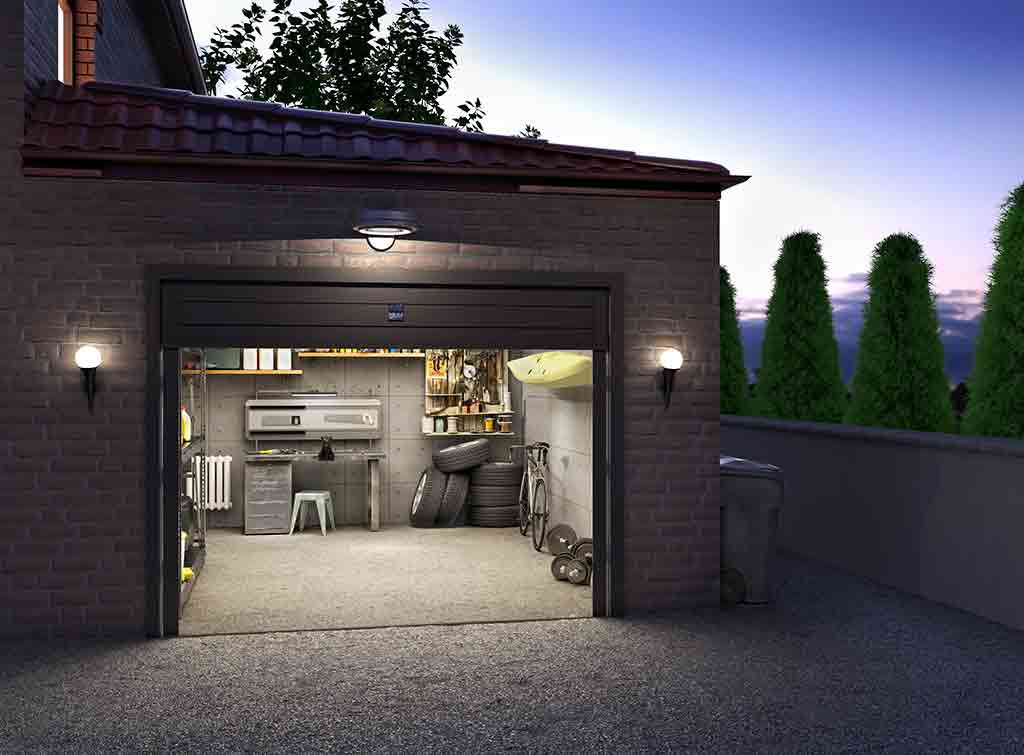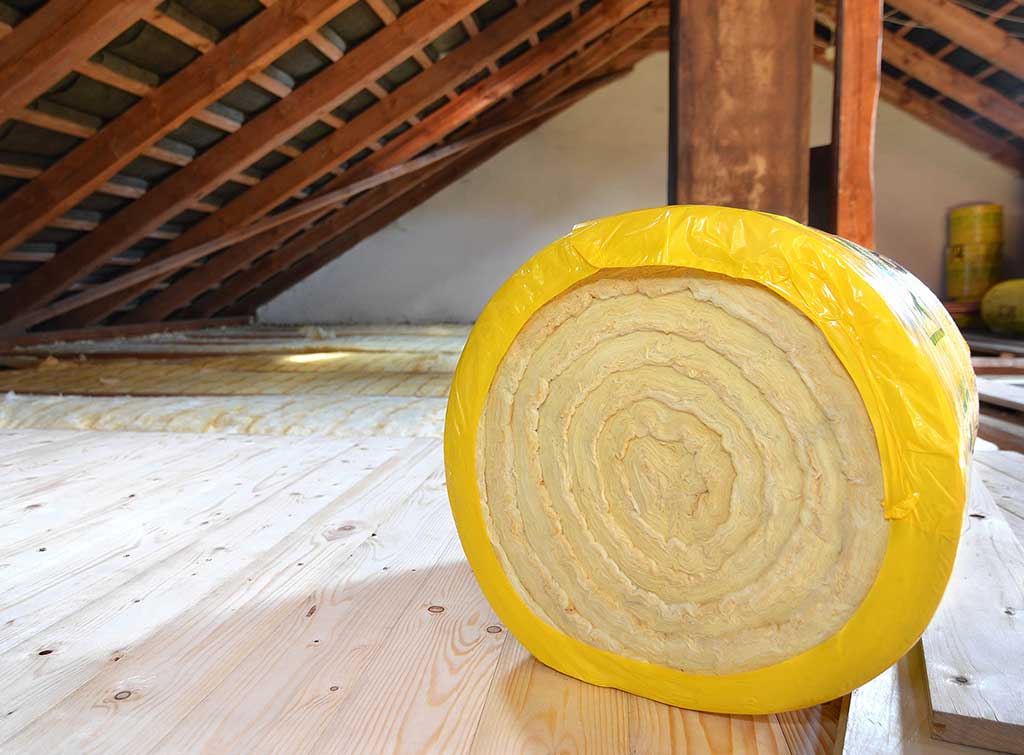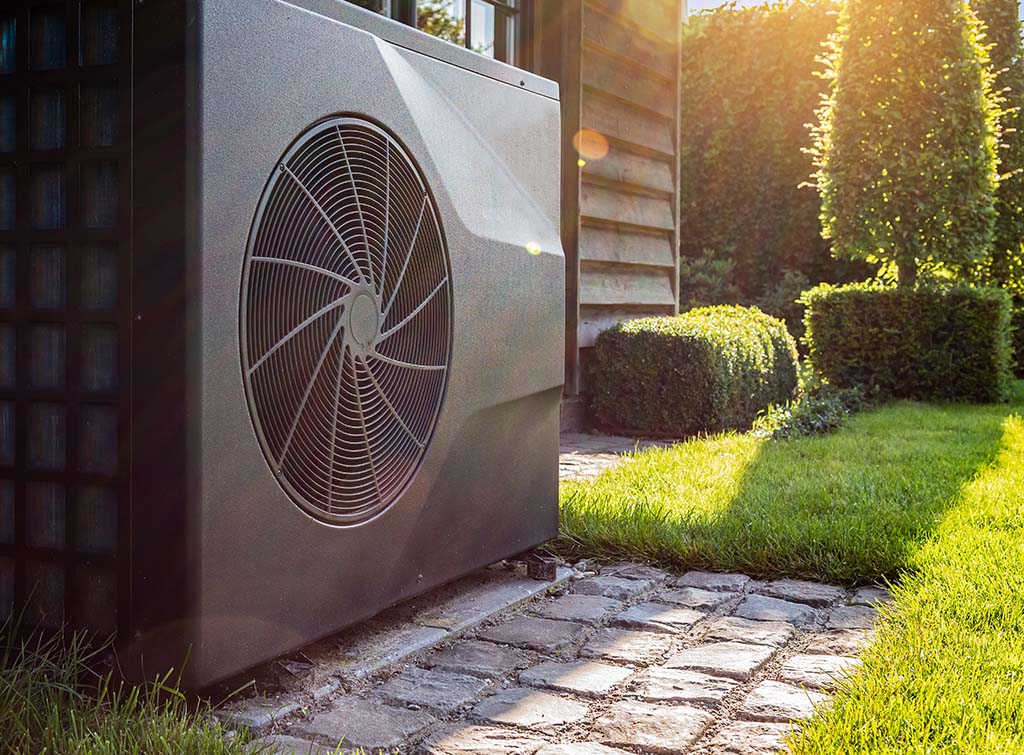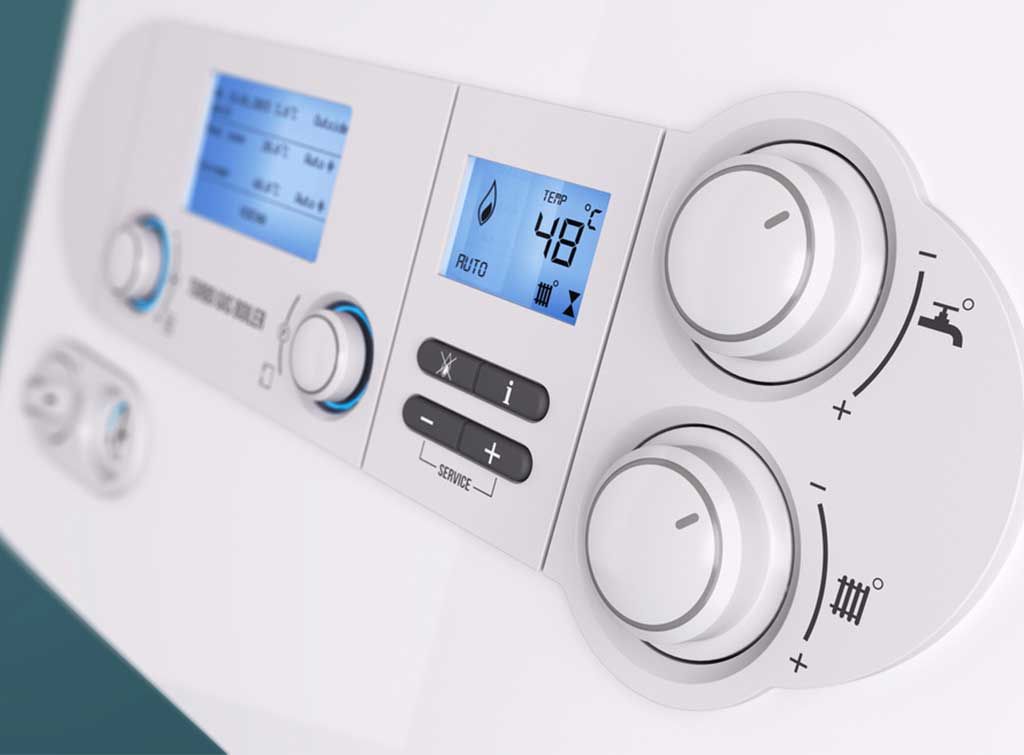Blog>Planning Guides>Planning for an air source heat pump
Last updated: 14 March 2025
Planning for an air source heat pump
As the UK moves towards its net zero target in 2050, homeowners are making the switch to renewable energy sources to heat their homes. Here, you'll find everything you need to know to help plan this green upgrade in your property.
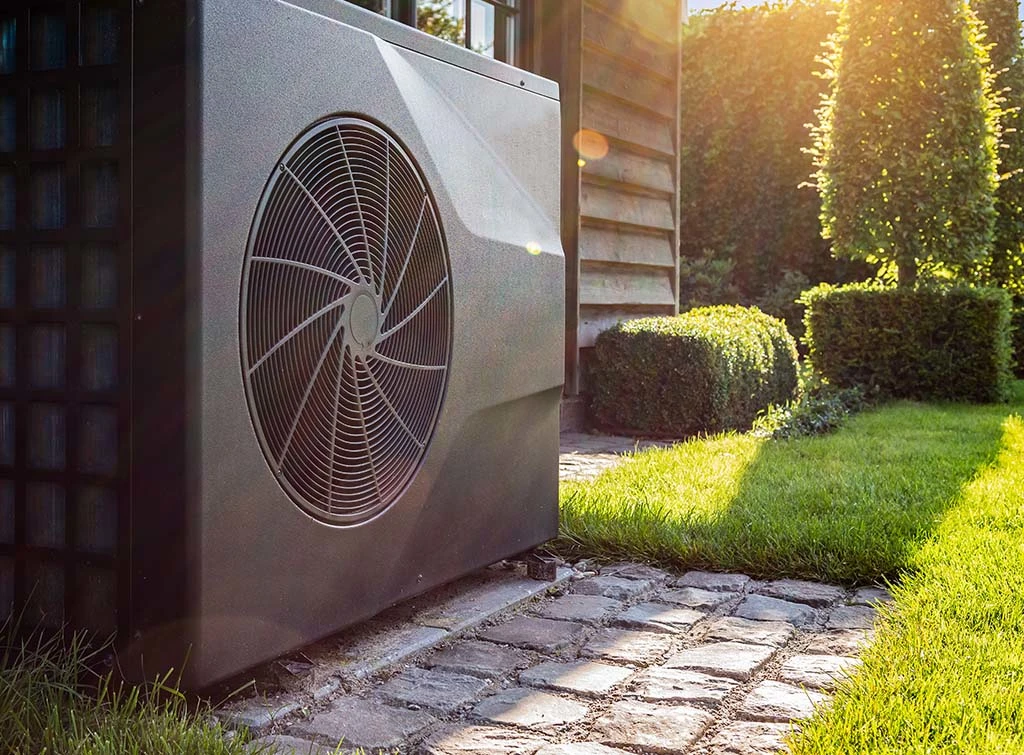
Air source heat pumps (ASHP) offer a more sustainable alternative to traditional heating methods.
In this guide, we outline all the key considerations when planning for an air source heat pump in your home, including the benefits, costs, the installation process, and tips for finding certified local installers.
See the tradespeople we've checked and recommend for your job
What is an air source heat pump?
An air source heat pump is a 'green energy' system that takes heat from the outside air to provide heating and hot water to your home.
It works efficiently even in low outside temperatures. In fact, air source heat pumps can extract heat from air temperatures as low as -15C.
There are two main types of ASHPs :
Air-to-air heat pumps: These systems transfer heat from the outside air into warm air to heat your home. They can also be used for cooling but they don't heat hot water, so you will still need a way to heat the water for your home
Air-to-water heat pumps: These take heat from the outside air and turn it into a water-based heating system to heat your home and hot water
Types of air-to-water heat pumps
There are two types of air-to-water heat pumps:
A monoblock system has all the components in one outdoor system with pipes taking water to the central heating system and hot water cylinder inside your property
A split system has components both inside and outside your home
Monobloc systems are cheaper and quicker to install and take up less space inside your home. However, they are considered less efficient than split systems.
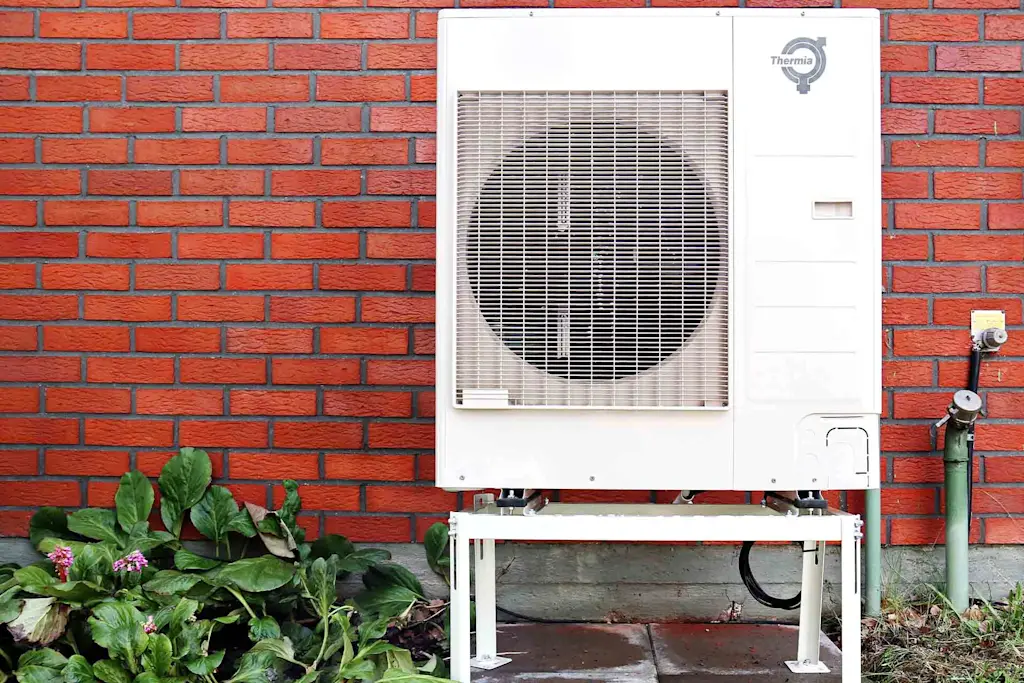
The benefits of an air source heat pump
There are several benefits of installing an air source heat pump.
As we've already touched upon, it's a sustainable way to heat your home, boasting a low carbon footprint. But what else is making homeowners take the plunge into this renewable energy alternative?
Increased energy efficiency: According to the Energy Saving Trust, heat pumps are more than three times more efficient than a gas or oil boiler, helping to lower your energy use
Reduced energy bills: Drawing from a renewable energy source (the air!) and being super efficient means, you guessed it, lower energy bills
A comfortable home: ASHPs provide heating and cooling (air conditioning), making it easier to keep your home ambient year-round
Increased property value: For all the reasons outlined above, prospective buyers will be more attracted to your home if you choose to market it, potentially leading to a higher sale price

On Checkatrade, you'll only find trades who meet our high standards and pass up to 12 checks.
Planning for an air source heat pump (ASHP)
If you're convinced of the merits of air source heat pumps, you'll naturally start to think about the practicalities of having one for your home.
In this section, you'll find answers to all your burning questions:
Where's the best spot for an air source heat pump?
Do I need planning permission for an air source heat pump?
Will my home need more insulation to benefit from an ASHP?
What type of tradesperson do I need to install an ASHP?
Can I get a grant to help with the cost of an air source heat pump?
What happens to my traditional heating system if I switch to an ASHP?
And more....let's get into it!
1. Where to install an ASHP
Available space for your ASHP
Ideally, you'll have a space outside where a unit can be fitted to a wall or positioned on the ground with access to good airflow. It will need to be accessible for future maintenance too.
If space isn't an issue inside your home, consider a split system, which has components both inside and outside your home.
However, if you are limited by space, for example, if you live in a flat, opt for a compact heat pump or an air-to-air heat pump. These will need to be installed on an external wall.
Room for a hot water cylinder
In addition, you'll need a way to store your hot water. This is typically done in a hot water cylinder.
However, not all households have space for a hot water cylinder. In this instance, there's the option of a hybrid system (an ASHP for heating and a boiler for hot water) or a heat battery.
Noise considerations
When your installer recommends the best spot for your air source heat pump, they'll factor in the proximity to bedroom windows and neighbouring properties.
ASHPs create a similar noise range as a fridge or a gas boiler. Current building standards state that your ASHP must only generate 45dB if it's one metre from one of your neighbour's windows.
Find an approved air source heat pump installer
A certified ASHP installer will assess the most suitable location for an air source heat pump, while making sure the unit is the optimal choice for your home's heating needs.
Search your postcode to find an air source heat pump installer with Checkatrade.
See the tradespeople we've checked and recommend for your job
2. Planning permission
In most cases, planning permission is not needed for an ASHP - they are considered permitted development. However, there are limits and conditions that must be met.
If you live in a conservation area or a listed building, it's best to contact your local planning authority before installing an ASHP.
3. Insulating your home
Part of getting your home ready for an air source heat pump is to make sure it's well insulated. A well-insulated home will help to ensure the efficiency of your heat pump and lower energy bills.
Home insulation can be improved in several ways, addressing heat loss through the roof, walls, floors, doors, windows, and more.
4. Installation certifications
For the safe and competent installation of your air source heat pump, it's crucial you hire a certified heat pump installer.
In addition to recommending the optimal setup for your heating needs, a certified installer will expertly remove your existing heating system, and hook up your new heat pump to the highest standards.
For reassurance you're dealing with a certified heat pump installer, look for:
MCS certification - an internationally recognised quality and safety scheme for small-scale renewable energy technologies
Renewable Energy Consumer Code (RECC) - a self-regulatory initiative that sets standards for consumer protection in the small-scale renewable energy sector
The Checkatrade trusted tick - you’ll only find trades who meet our high standards and pass our checks on Checkatrade
Contact or pay a trade through Checkatrade and you’re covered by our 12-month guarantee of up to £1,000*

5. Renewable energy grants
The government introduced the Boiler Upgrade Scheme (BUS) to help homeowners invest in green energy solutions.
Providing you meet eligibility criteria, you can apply for a grant of up to £7,500 to help towards the cost of replacing your fossil fuel heating system with a heat pump.
6. Your existing heating system
Most homeowners heat their homes and hot water using a traditional heating system (involving a boiler and radiators), so there are naturally a few questions about this.
Can I keep my boiler if I get a heat pump?
Potentially. An air source heat pump can work with a boiler as a hybrid system.
Can I keep my existing radiators with a heat pump?
In many cases, your existing radiators won't need to be replaced - they'll work well with your new heat pump.
Can heat pumps use existing pipework?
A certified installer will assess your existing pipework to check it's suited to the flow temperature and lower-temperature water used by the heat pump.
Can you connect a heat pump to an existing heating system?
Yes! An add-on heat pump works with your existing heating system. In summer, it'll cool your home like an air con unit would and in the winter, it'll heat your home.
Get professional advice from the experts
An air source heat pump is an investment that you want to get right. After all, it could last up to 25 years.
We recommend reaching out to certified local installers when planning for an air source heat pump. With the benefit of their expert advice, you can be sure of making the best choice for you and your home. Search your postcode to get started.
See the tradespeople we've checked and recommend for your job
How is an ASHP installed?
An air source heat pump typically takes 2-5 days to install, depending on the scope and complexity of the job.
Firstly, a certified installer will assess your heating needs, check whether your home is suitable for an ASHP, and identify the best location for installation.
Next, if your old boiler is no longer needed, it will be safely removed. The new heat pump unit will then be installed and connected to the heat distributors in your home (e.g., radiators or underfloor heating).
Finally, with the wiring complete, your installer will run final checks to make sure your new heating system works correctly.
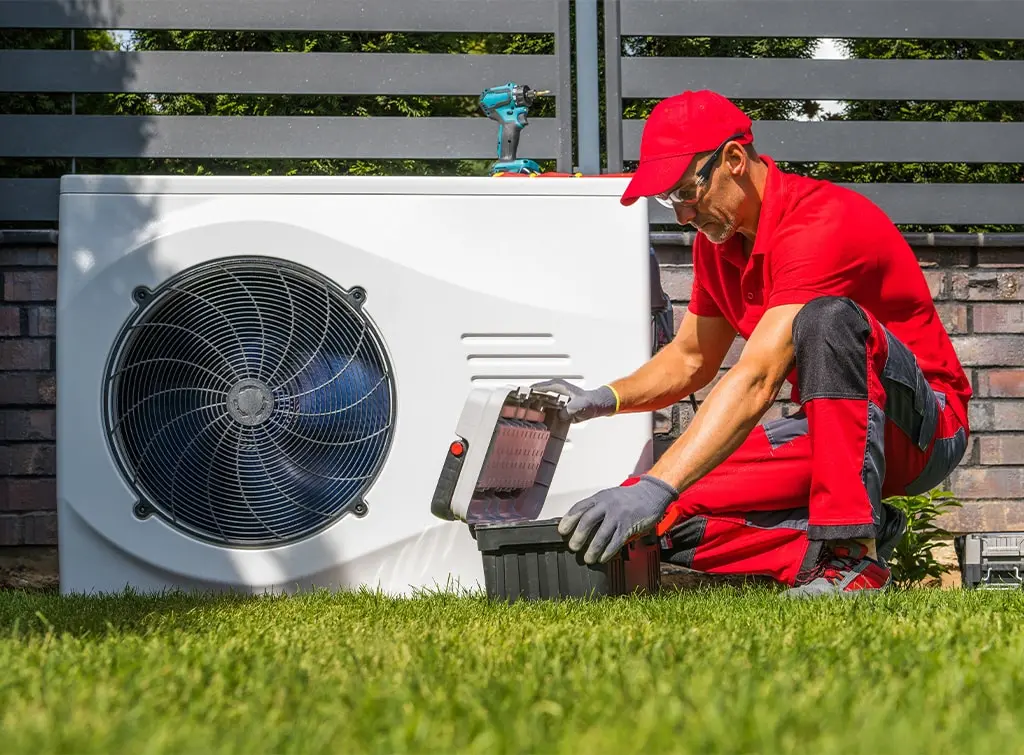
How much does an air source heat pump cost?
When researching the cost of air source heat pumps, you may find a broad range of prices.
This is because air-to-air heat pumps are generally cheaper than air-to-water heat pumps. But also, the size of your home, how well insulated it is, the brand you choose, and your heating needs will all impact your quoted price.
Air source heat pump installation costs
As a guide, expect to pay, on average:
£15,000for the supply and installation of an air-to-water heat pump
£3,000for the supply and installation of an air-to-air heat pump
Take a look at our air source heat pump cost guide for more information to help you budget.
We always recommend getting at least three quotes to compare.
Air source heat pump running and maintenance costs
In addition to the cost of the heat pump and installation, it's important to understand the ongoing running and maintenance costs.
Running costs will vary from home to home, so ask your installer if they can give you any information.
Your running costs will be affected by the efficiency of your chosen pump, the room temperature you require, your home's insulation, and the temperature of the heat source.
ASHP servicing and maintenance
However, the costs relating to servicing and maintenance are more standardised.
Air source heat pump servicing typically costs between £150 - £300 and is recommended annually. However, many providers will offer a heat pump service plan, which will work out slightly cheaper**.**
Take a look at our guide to heat pump servicing and repair costs for more information.
Additional costs
Following the installation of your heat pump, some areas of your home may need repair or cosmetic work. For example, filling holes or repainting.
Our guide to the cost of popular trades will help you to budget for these expenses.
Finding a qualified air source heat pump installer
Ready to find a certified air source heat pump installer near you?
Our hiring guide contains plenty more information to help you hire right, hire once.
Remember, look for MCS certification, RECC association, and of course, the trusted tick of approval from Checkatrade.
Search your postcode to find certified air source heat pump installers near you.
See the tradespeople we've checked and recommend for your job
More Planning Guides
More Air Source Heat Pump Installation - ASHP Articles
See the tradespeople we've checked and recommend for your job

